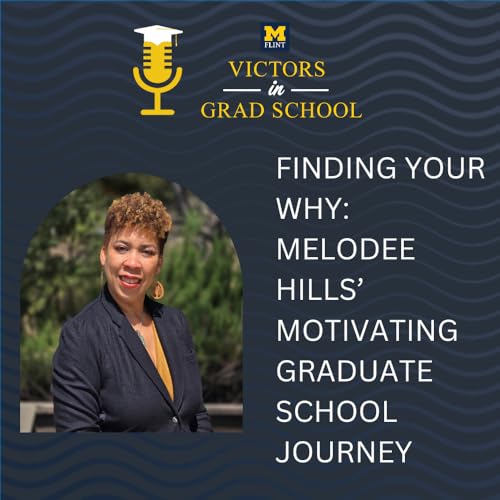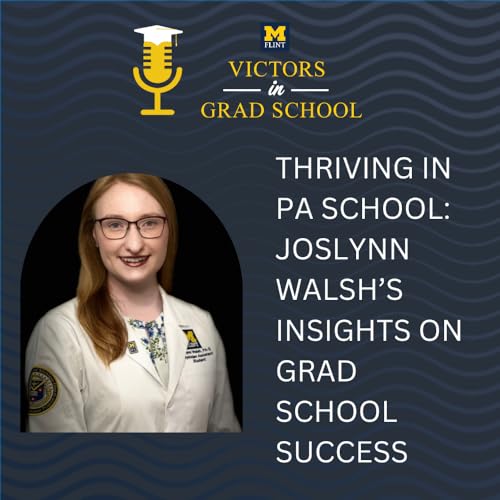Embarking on graduate school is more than a simple academic step—it's a deeply personal journey, one that evolves and reshapes your goals, expectations, and life direction. The latest episode of the "Victors in Grad School" podcast welcomes Michael Cevick, Professor Emeritus from the University of Michigan-Flint, to share his inspiring story of growth, perseverance, and transformation through higher education. From his beginnings at what is now Mott Community College to earning a Bachelor of Fine Arts at the University of Michigan, and ultimately achieving an MFA—the terminal degree in his field—Michael Cevick's trajectory is a testament to resilience and purposeful planning. He didn't take the straightest course: after his associate's degree, he paused his education to pursue music, returning later with renewed commitment to finish his bachelor's and then move into graduate study. A key theme in this episode is the importance of intentionality and adaptability. Michael Cevick discusses applying to several graduate schools, carefully weighing family, work, and personal responsibilities—all while keeping his professional and creative aspirations in focus. His approach underscores the value of aligning educational pursuits with life circumstances and long-term goals. The conversation with Dr. Christopher Lewis pulls back the curtain on the real challenges of graduate education: managing transitions, facing imposter syndrome, and adapting to higher expectations. Michael Cevick shares candid moments of doubt and anxiety—especially as he moved straight from being a student to teaching others. His experience highlights the necessity of support networks, mentorship, and self-advocacy in maintaining balance during demanding times. Listeners will also take away practical advice on time management, perseverance, and leveraging campus resources. Michael Cevick urges students to seek out help, use support systems, and remember that most people you meet in graduate programs genuinely want you to succeed. Whether you're considering graduate school, already on your way, or simply in need of motivation, this episode is packed with valuable lessons and heartfelt encouragement. Michael Cevick's journey reminds us that roadblocks can become stepping stones, and that with the right mindset and support, graduate school can be a profoundly rewarding adventure. Tune in and be inspired by a story of perseverance, community, and lifelong learning. Begin your own journey toward becoming a victor in grad school! TRANSCRIPT Dr. Christopher Lewis [00:00:01]: Welcome to Victors in Grad School, where we have conversations with students, alumni and experts about what it takes to find success in graduate school. Dr. Christopher Lewis [00:00:11]: Welcome back to Victors in Grad School. I'm your host, Dr. Christopher Lewis, Director of Graduate programs at the University of Michigan, Flint. Really excited to have you back again this week. You know, every week I love being able to talk to you about the journey that you are on. And I call it a journey because every student that's thinking about graduate school and goes on a journey, whether you're at the very beginning and you're just starting to think about this, you've maybe you've applied, maybe you've gotten accepted, maybe you're in graduate school. Throughout this entire process, you're going to be going through a personal journey toward the goals that you've set for yourself. That's why this show exists. Dr. Christopher Lewis [00:00:48]: This show is here to be able to help you to find ways that you can be successful in that graduate school journey. That's why every week I love being able to have different people with different experiences that can talk to you about the journey that they went on. And then you can learn a little bit for yourself and take what you hear, set it aside, doesn't matter, learn from them, and hopefully be able to find some tips, some tools, some tricks, some things that you can do to help you on the journey that you personally will have. Today we have another great guest. Mike Sevik is with us today. And Mike is a professor emeritus from the University of Michigan, Flint. He was an associate professor of art for many years at the University of Michigan, Flint. We're going to be talking to him about his journey from starting at a community college to moving to a bachelor's, to a master's and then to teaching. Dr. Christopher Lewis [00:01:45]: So really excited to be able to have him here and for us to learn from him and his own journey. Mike, thanks so much for being here today. Michael Cevick [00:01:52]: Thanks for having me. I hope this helps. Dr. Christopher Lewis [00:01:54]: Well, I really appreciate you being here. And I'm going to turn the clock back in time. I want to go all the way back. I want to go back to. Let's go back to the beginning in the sense of you started your undergraduate work at Mott Community College. It wasn't called Mott ...
Show More
Show Less
 12 mins
12 mins 20 mins
20 mins 29 mins
29 mins 24 mins
24 mins 18 mins
18 mins 23 mins
23 mins 18 mins
18 mins 23 mins
23 mins
